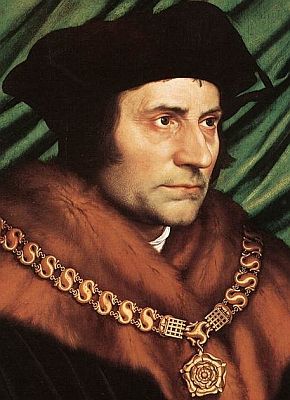Saint Thomas More

Martyr
Feast Day: July 9
Thomas More was born in London on February 7, 1478, the eldest son of John More, a lawyer who was later knighted and appointed a judge. His mother probably died when Thomas was still young.
Thomas was already employed by the Archbishop of Canterbury as a young boy. He then studied law at Oxford, where he seems to have spent two years, and in London. In the meantime he broadened his interests in the areas of culture, theology, and a thorough education in formal logic. He studied Greek and Latin and enjoyed the company and friendship of important figures in Renaissance culture, including Erasmus of Rotterdam.
In 1504 Thomas became a member of the English House of Commons. Erasmus often stayed with Thomas at home and wrote the Praise of Folly there in 1509, dedicated to him. Thomas and Erasmus also conducted an extensive correspondence. In 1510 Thomas became a judge and shortly afterwards undersheriff of London.
At the end of 1504 he married Jane Colt; they had three daughters and a son. In 1511 he married Alice Middleton. In 1518 he was even ennobled. During this time he also fulfilled a political role. He was not only one of the most important politicians of Europe, he was also one of the greatest humanists of his time. He was extremely learned.
More was a warm advocate of a reform of the Catholic Church: back to the source and understanding the gospel with the help of Greek and Roman writers and philosophers.
He writes a book "Utopia." This book presents many themes such as wealth, power, slavery and causes of injustice. The overarching theme in the book is the ideal nature of a utopian society. In Utopia there is no greed, corruption or power struggle because there is no money or private property. His work is a social satire and not a model example.
His great intelligence, impartiality and wisdom attracted the attention of King Henry VIII. He rose through the ranks of Parliament and became Lord Chancellor in 1529.
Thomas More was a staunch supporter of the Pope in Rome. When King Henry VIII rejected the authority of the Roman Catholic Pope in Rome and established an independent church in England, a conflict arose between him and Thomas.
Henry VIII demanded that Thomas take an oath, known as the "Act of Succession and Oath of Supremacy", which denied the authority of the Pope and declared that the King was the absolute authority in England, that Anne was Queen and that her children would be the rulers of England. Thomas refused. The King then accused him of treason and he was imprisoned in the Tower of London. For a year Thomas was imprisoned, sick and deprived of the Holy Sacraments. His crime: he was a Catholic.
During a special trial in Westminster Hall, More continues to appeal to his conscience and is sentenced to death. Just before his death, Thomas is said to have shown another example of his subtle humor. When climbing the scaffold, he stumbled on the last step. The executioner, who was already standing ready, rushed to catch him and help him up. To which Thomas must have remarked: “Yes, you almost missed your executioner’s reward there.”
He was beheaded on Tower Hill on 6 July 1535. His body was buried in a mass grave on the prison grounds. His head was impaled on Tower Bridge as a deterrent. That head was eventually buried in the family vault of the Roper family, the in-laws of his daughter Margaret, in the parish church of St Dustan in Canterbury.
In 1886, More was beatified by Pope Leo XIII. He was canonised on 19 May 1935, 400 years after his execution.
Patron saint: of lawyers, politicians, and statesmen.